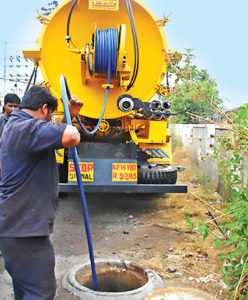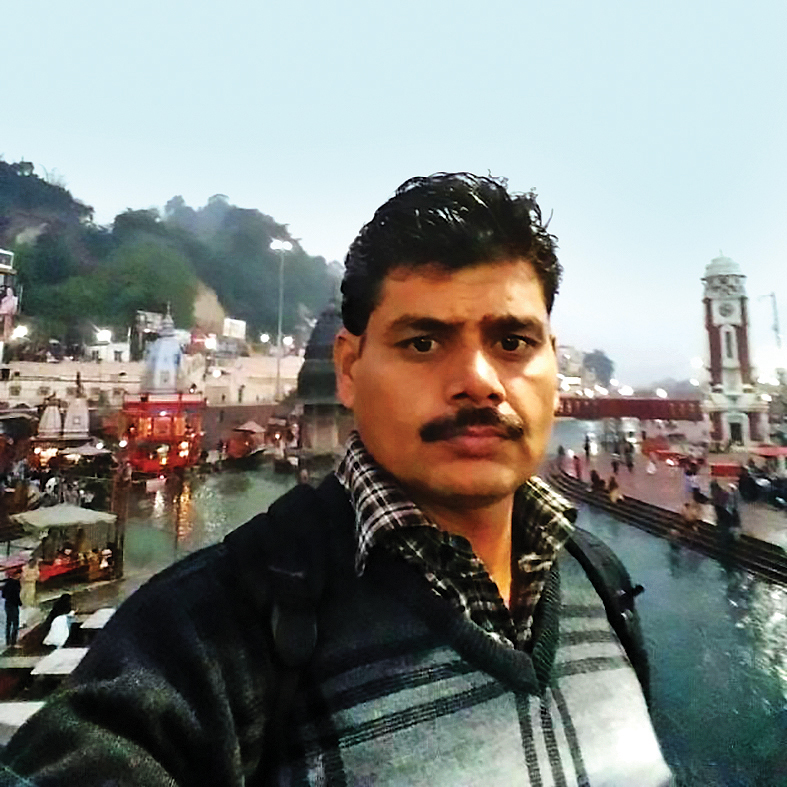Yet again, two workers in Gurugram met an untimely death after inhaling noxious gases while cleaning a tank. The sad saga of manual scavenging continues
Another shocker, another safety lapse, another mishap and six more deaths. Yes, there’s no letup in the shameful practice of manual scavenging, in the city or across the country. Gurugram and Tiruppur (Tamil Nadu) are in two different parts of the country, yet, they shared a dreadful evening for the same reason –– deaths due to manual scavenging.
On Sunday, April 14, in Gurugram and in Tiruppur, a total of six persons suffered asphyxiation after they went inside a tank to clean it and inhaled poisonous gas. The gas is known to be a deadly mix of ammonia, hydrogen sulfide, methane and carbon monoxide.
“The gas is so powerful and poisonous that even if one is passing by and gets exposed, one can lose consciousness,” says Shailesh Tiwari, 37, a water treatment worker from UP.
In his 15-year career working in different industries, Tiwari never saw an accident as severe as the one that happened on Sunday. It was 3:30 pm, the sun was ablaze and Tiwari was working at the manufacturing unit of Sunbeam Auto Pvt Ltd. Tiwari had nothing to do with the cleaning of the tank — that was the unseemly task assigned to two of his colleagues –– Shiv Kumar (35) and Aslam (33).
Both these persons were asked to clean a tank at the unit. As Tiwari told Patriot, the tank was “not opened a day before as it should be, to let the toxicity escape.” Although Tiwari, Kumar and Aslam told the contractor (who is nowhere to be found now), that the tank should have been left open before workers were assigned to clean it, “The contractor did not take us seriously and showed total callous disregard for their safety.”
He recalls the time when he was working in a factory in Mathura to look after the water treatment plant there, and how the contractor ordered for the tank to remain open for two days to allow the gas to escape.
As Tiwari recalls Sunday’s incident, he laughs at some bits, as he doesn’t seem to grasp the magnitude of this deeply-rooted problem in our society, the inhuman practice of manual scavenging. His attitude suggests that the workers have been conditioned in such a way that they do not realise the gravity of the offence.
“Aslam went first into the tank. Since the water inside the tank had been vaccuumed very quickly, only gas was left in the tank,” relates Tiwari. While Aslam was inside the 10-feet deep tank, Kumar was standing by, waiting for Aslam to call. However, he did not hear any signal from Aslam and went in to check.
“Right after getting down from the stairs, he (Kumar) collapsed. I was near the tank and ran to help Kumar and Aslam, screaming for help. In no time, some other workers and one person named Prabhat, came in to help the trio. They took out Aslam and Kumar and called for an ambulance,” says Tiwari.
Tiwari too lost consciousness for some time, during which he “could not see anything for a few minutes.” However, when he came to, he washed off the sewage from his clothes and rushed to Kathuria Hospital in Modal Town, Gurugram.
“I left for the hospital 20 minutes after the incident. And right after reaching the hospital my back started paining severely. It felt like paralysis,” says Tiwari.

According to Medical Director AK Kathuria, the two “were gasping profusely and no blood pressure could be registered. All life-saving treatment like medical ventilator (respirator) was tried to save their lives.”
The two survived only for 15-20 minutes before they were pronounced dead, says the doctor.
Enraged by the tragedy, the Sunbeam Workers’ Union organised a protest on Sunday in Gurugram. Union members submitted a complaint in Badhshahpur Police Station. The police visited the company for further investigation but waited for the deceased persons’ relatives to arrive to file an FIR.
However, reports have surfaced that the victims’ relatives refused to file a complaint and called this unfortunate accident an “industrial accident.” As per a national daily, Aslam’s cousin Shakeel claims that “Such accidents are very common Gurgaon nowadays and we believe that was also an accident. We do not want to register any case. We just want to take his body back and complete his last rites.”
In another report of a national daily, a union member claims that a settlement was worked out between the management of the company and the families of the deceased. However, the same report also quotes Shakeel (Aslam’s cousin) that “No such settlement has taken place. We are going to Bihar for the last rites.”
The management of the company also told the daily that “no complaint has been filed against us. The matter is being investigated internally.
To confirm whether the families of the deceased lodged the complaint (or not) and the status of the case, Patriot reached out to station house officer (SHO) of Badshahpur Police Station.
“They (relatives) did file an official statement which is registered in the official diary of the police station. We are waiting for the post-mortem report to come and if we find further clues then we will investigate further based on that,” says Mukesh Kumar, SHO, Badshahpur Police Station, Gurugram.
He also says that the concerned department of the “DC office” will further look into this case.
Bezwada Wislon, activist and National Convener of the Safai Karmchari Andolan says that the team members of his organisation are in touch with the relatives of the deceased and have also sent a letter to National Human Rights Commission (NHRC).
“When such an incident happens, it has to be reported and an FIR should be filed. Post-mortem report can come but the cause of death can only be poisonous gas. Otherwise how did they die? There is no other reason for their deaths. If they were provided gear, then how did they die? How do all these deaths happen then?” asks Wilson.
Shailesh Tiwari, the survivor, told Patriot that the deceased persons were provided gear. However, one cannot fathom how the mask which is provided along with the gear could not help the two survive.
Tiwari also says that in the past when he was working in the Mathura factory, there was a proper procedure which was followed before the workers used to be sent in the tank. “They would use blower to get rid of the gas and also check its sensitivity before asking someone to clean it.”
Since Tiwari did not go inside the tank, he did not inhale too much of the poisonous gas, and was discharged after 24-hour supervision in the hospital. Currently, he’s at his home in Auraiya district in Uttar Pradesh. Although he’s on bed rest, he says he’s “fine, taking the prescribed medication and breathing as before.”
As he concludes the conversation, he reveals, “I will return to the same unit (Sunbeam’s) next month. Since my current work is largely about managing RO and water treatment tanks at the site.”
He confirms that he has been in sewage tank before in the past “but with proper gear”. It is clear that he does not think manual scavenging with safety gear is wrong. Yet the sad fact remains that this hazardous work continues and is taking lives one after the other.





